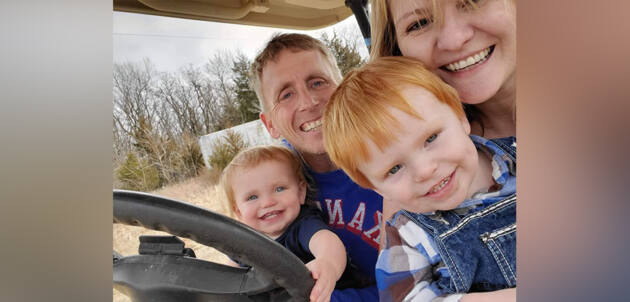Floyd Bledsoe spent nearly 16 years behind bars for a horrendous crime he didn’t commit.
Now, he is back in prison five days a week — voluntarily — teaching spiritual truths and life skills to men he wants to see make it once they are released.
For the past year, Bledsoe has been employed by Freedom Challenge, a ministry of Adult & Teen Challenge U.S.A. He is the supervisor of the H.O.P.E. Project (Helping Others Prepare for Employment) at Hutchinson Correctional Facility in Kansas. It’s the same prison where Bledsoe served most of his term.
“One of the reasons I go back is because of the impact Freedom Challenge volunteers made on me,” says the cheerful Bledsoe, 43. “My hope is to share the gospel and let others know their lives can be changed.”
In 1999, Bledsoe began serving a life sentence after being convicted of the kidnapping, assault, and first-degree shooting murder of his 14-year-old sister-in-law Zetta Camille Arfmann.
“My faith was the only thing I had left that they couldn’t take away from me,” says Bledsoe, who now attends Mount Olivet Worship Center, a Pentecostal church in Hutchinson. “I learned to lean on God and He revealed himself to me those 16 years.”
After DNA testing in 2015 pointed to Bledsoe’s older brother Tom, as the one who assaulted the teenage girl, Tom killed himself. Tom left a suicide note admitting his guilt and Floyd’s innocence.
Thanks to the persistence of the Innocence Project, a Kansas court exonerated Floyd of all charges.
MODELING FREEDOM
Biblically based teachings on character and values are the foundations of the Freedom Challenge program. Bledsoe explains the H.O.P.E. Project is also designed to teach social skills and a good work ethic so that trainees will be better prepared to handle life once they are back on the outside.
H.O.P.E. Project recycles mattresses, box springs, and other furniture. Proceeds from refurbished products such as chicken coops and lawn chairs are funneled back into the Freedom Challenge ministry. Bledsoe works with his mentor, Assemblies of God U.S. missionary Donald W. Starnes.
“On-the-job training equips the men to be successful in life, vocation, and community,” Starnes says.
Starnes has served as director of Freedom Challenge since 2005. The ministry has four paid staff and 10 regular volunteers. The cooperative effort with the Kansas Department of Corrections became the first full-scale implementation of the drug and alcohol rehabilitation program behind prison walls.
Floyd Bledsoe (standing in dark blue shirt) watches the Kansas governor sign a law that provides compensation for his years of wrongful imprisonment.
More than 220 men have graduated from the program, which begins with eight months of traditional Adult & Teen Challenge instruction, followed by four months of hands-on job training application.
Although Bledsoe didn’t have any criminogenic life-controlling issues himself while confined, he graduated as the first Freedom Challenge intern. His prison track record is a plus in reaching inmates today.
“Guys who are incarcerated understand he knows the world they’re living in,” says Starnes, 61. “They are amazed that he came back freely after being unjustly incarcerated.”
Bledsoe has mixed feelings over the current national upheaval regarding police procedural tactics.
READ: Success stories of Adult Teen Challenge
“Rioting and looting is nonsense,” Bledsoe says. “Police have a right to defend themselves if someone is fighting them — but not the right to kill unarmed suspects.”
Bledsoe says he didn’t suffer physical mistreatment at the hands of law enforcement personnel after being arrested. But he contends he endured verbal onslaughts and intimidation from interrogators seeking to coerce a confession.
The years in prison shattered his family ties. His parents stopped speaking to him, his wife divorced him, and his two young sons forgot him. A few familial relationships have been rekindled, including Bledsoe reconnecting with his sons.
“There are still issues to work through,” Bledsoe says. “We get along, but it is a different type of relationship than normal. It will never be what it could have been.”
In 2017, Bledsoe married Amanda Ingram, a prison volunteer whom he met while incarcerated. They have a 2-year-old son, Bryce, and a 1-year-old daughter, Brynlee. They also are raising Amanda’s 4-year-old son from her first marriage, Blake.
SEEKING FURTHER JUSTICE
When exonerated, the state offered Bledsoe no remuneration for the years that had been stolen from him. He spearheaded successful efforts to change the law. In 2018, the Republican-controlled Kansas Legislature passed a bill enabling those whose wrongful convictions have been overturned to collect $65,000 per year for each year interned. Then-Gov. Jeff W. Colyer (R) personally apologized to Bledsoe. Last year, Bledsoe received just over $1 million in compensation from the state.
Bledsoe still has a civil lawsuit pending against various police officers, attorneys, and investigators — who all have claimed immunity from liability for civil suit damages. Last year, the Tenth Circuit U.S. Court of Appeals concluded that Bledsoe’s conviction stemmed from fabricated evidence.
The suit details how Tom Bledsoe initially confessed to the crime, led authorities to the body, gave the murder weapon to police, and described intricate details of the killing. After Tom had been in jail a few days, Floyd maintains that the prosecutor and other defendants devised a scheme to pin the killing on him. Tom recanted his confession and went free. Tom’s false account of implicating his brother became the prosecution’s central piece against Floyd, the suit states.
In his suicide note, Tom wrote that the police and county attorney compelled him into lying to frame his brother. The suit maintains the officials fabricated evidence, falsified testimony, and withheld exculpatory information.
The Innocence Project estimates 3 percent of those in correctional facilities have been wrongly incarcerated. Since its founding in 1992, the nonprofit organization has helped over 375 wrongly convicted prisoners gain freedom through DNA testing.
by John Kennedy | AG News Service
